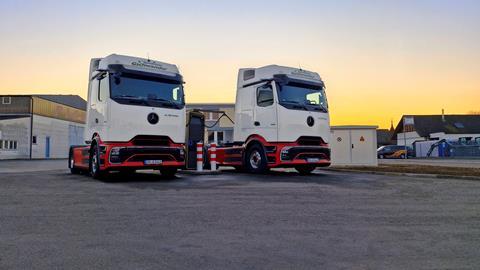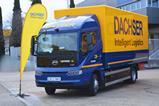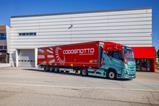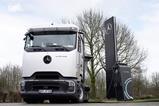A medium-sized German haulier has gone straight from diesel to electric — and is now planning to generate its own green electricity. The shift has already attracted job applications from drivers drawn to the new electric lorries.
Spedition Gschwander’s first four battery-electric Mercedes-Benz eActros 600 trucks have been in operation since early 2025, handling cross-border journeys between Germany, France, and Switzerland and tackling demanding routes through the Swabian Alb and Black Forest.
“We are not satisfied with an 85 to 90 percent reduction in CO₂; we want to achieve 100 percent climate-neutral transportation,” explained Simon Gschwander, project manager at the company.
The electric trucks face similar demands to their diesel-powered counterparts, including frequent trips involving cross-border delays and mountainous routes. This necessitates careful planning for recharging.
“Dispatchers not only have to ensure timely returns in accordance with driver hours but also need to identify available charging points along the routes. Finding suitable charging options remains the biggest operational challenge,” explained Simon Gschwander.
Spedition Gschwander uses a decentralised charging infrastructure comprising seven Alpitronic Hyc 400 chargers, each offering a peak output of 400 kW. Two chargers are installed at the company’s Teningen headquarters, two at Dotternhausen, and three more at customer locations throughout Baden-Württemberg.
According to Mercedes-Benz, recharging the trucks from 20% to 80% battery capacity takes about one hour.
The company plans to further enhance its sustainability credentials by installing a 600 kW photovoltaic system on its warehouse roof, coupled with battery storage, allowing the lorries to be charged with self-generated green electricity even when solar energy production is low.

Technically, the eActros 600 is equipped with three lithium iron phosphate (LFP) battery packs, offering a total installed capacity of 621 kWh. It also features a newly developed, particularly efficient electric drive axle designed in-house by Mercedes-Benz Trucks. The model designation ‘600’ refers to this high-capacity battery system, which enables a real-world range of up to 500 km without intermediate charging under typical long-haul conditions.
Financially, Daimler Truck notes that the initial cost of the eActros 600 is two to two-and-a-half times higher than diesel equivalents. However, significantly lower energy consumption (less than half that of diesel trucks) and EU-wide toll exemptions for zero-emission vehicles allow the eActros 600 to achieve cost parity with diesel vehicles over a five-year period, assuming approximately 120,000 km travelled annually.
However, payload remains a significant consideration, particularly for silo transport. The electric trucks offer approximately 22 tonnes of payload compared to 24–26 tonnes for diesel counterparts.
“This is particularly crucial in our segment, where every gram counts,” said Gschwander, who suggests legislative adjustments may be necessary.
Despite these challenges, driver feedback has been overwhelmingly positive.
“After just a few weeks, no driver wanted to return to diesel. Young drivers especially like electric trucks. We’ve even received job applications referencing our eActros 600 social media posts,” noted Gschwander.
Spedition Gschwander received training for its drivers from Mercedes-Benz Trucks, covering both electric truck operation and high-voltage technology. Additionally, Mercedes-Benz’s eMobility Consulting division supported the company in developing their charging infrastructure alongside Freiburg-based energy provider Badenova.
“Our decentralised charging network provides essential flexibility for our fixed transport routes,” said Simon Gschwander, emphasising that the company’s transition to electric trucks “is driven by conviction rather than immediate financial returns”. The company plans to add four more electric trucks to its fleet in the coming weeks.
The deployment of the eActros 600 and associated charging infrastructure was supported by €2.4m in funding from the German Federal Ministry for Digital and Transport.


















